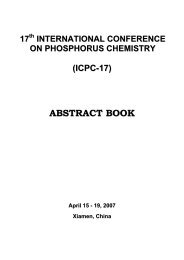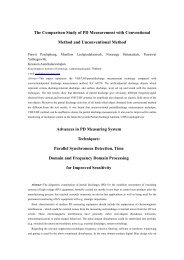New Modes of GPCR Signalling
New Modes of GPCR Signalling
New Modes of GPCR Signalling
Create successful ePaper yourself
Turn your PDF publications into a flip-book with our unique Google optimized e-Paper software.
ABSTRACT<br />
Regulation <strong>of</strong> Cellular Metabolism by Protein Lysine Acetylation<br />
Shimin Zhao, Wei Xu , Wenqing Jiang, Wei Yu, Yan Lin, Tengfei Zhang, Qunying Lei,<br />
Yue Xiong and Kun-Liang Guan<br />
Molecular and Cell Biology Laboratory, Institute <strong>of</strong> Biomedical Sciences, Fudan<br />
University, Shanghai 20032, China<br />
Protein lysine acetylation has emerged as a key posttranslational modification in cellular<br />
regulation, in particular through modification <strong>of</strong> histones and nuclear transcription<br />
regulators. We show that lysine acetylation is a prevalent modification in enzymes that<br />
catalyze intermediate metabolism. Virtually every enzyme in glycolysis,<br />
gluconeogenesis, tricarboxylic acid (TCA) cycle, urea cycle, fatty acid metabolism, and<br />
glycogen metabolism was acetylated in human liver tissue. The concentration <strong>of</strong><br />
metabolic fuels, such as glucose, amino acids, and fatty acids, influenced acetylation<br />
status <strong>of</strong> metabolic enzymes. Acetylation activated enoyl-Coenzyme A<br />
hydratase/3-hydroxyacyl-Coenzyme A dehydrogenase (EHHADH) in fatty acid<br />
oxidation and malate dehydrogenase (MDH) in the TCA cycle, inhibited<br />
argininosuccinate lyase (ASL) in the urea cycle, and destabilized phosphoenolpyruvate<br />
carboxykinase (PEPCK) in gluconeogenesis. Our study reveals that acetylation plays<br />
a major role in metabolic regulation.












